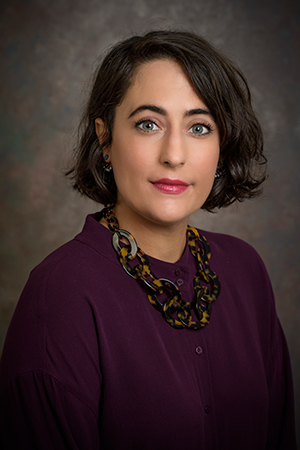Rose earned her PhD at the University of Pennsylvania in religious studies in 2014. She is currently the assistant director of the Center for Teaching and Assessment of Learning at the University of Delaware. Follow her on Twitter @MuravChick.
What did you hope for in terms of employment as you completed your PhD?
A full-time teaching-intensive position, preferably at a liberal arts institution. Teaching is what kept me motivated to finish the dissertation and what I saw myself doing and being happy doing. I did, however, actively pursue leads in alt-ac careers during the last few years of the PhD.
 What was your first post-PhD job?
What was your first post-PhD job?
I was a Mellon Post-Doctoral Fellow teaching religion at an elite liberal arts institution.
What do you do now?
We call ourselves “faculty developers,” which means we work with instructors to develop their teaching practices to best meet their needs as well as the needs of our students. In title, I’m an assistant director, which reflects many of the administrative and planning aspects of my job as well.
How did you get this job?
I applied for it through a post I saw online. I went through a Skype interview and then an on-campus day of interviews and a workshop demonstration. It was very similar to a traditional academic job interview, though the process was significantly more transparent and dignified.
What kind of tasks do you do on a daily and weekly basis?
On a daily basis I answer and send a lot of emails! I answer quick faculty questions, I schedule meetings with faculty and administrators, answer questions from other staff colleagues about services or support we offer… On a weekly basis, I will have several committee-style meetings. We plan dozens of teaching-related events annually, so we meet regularly for those. I also spend a lot of time planning our communications work (via our newsletter, Twitter, occasional campus newspaper articles, and direct emails). I prepare materials for workshops, trainings, and orientations. I meet with faculty members in my office (or via phone or video call) for private consultations. I do a fair amount of writing, including things we call “one-sheets” that are quick reference tip guides for teaching issues. That involves research, so I read articles from the science of teaching and learning (SoTL) area to make sure that we are backing our strategies with evidence. Our office also has a weekly two-hour meeting where we debrief and divide future tasks. I also teach one course a year, so if I’m teaching I also prep for class. We are a very small shop for the size of our campus, so we all wear a lot of hats. I’m sure I’ve left things off of this list!
What most surprises you about your job?
That it is truly a 12-month, full-time, administrative support role. We are always busy with something, and our faculty and administrative colleagues rely on us for a huge amount of programming and support.
What are your favourite parts of your job?
I am surprised at how much I enjoy writing for our newsletter and other communications and publicity documents. This is basically marketing and PR, and I love it! I get to come up with names for initiatives and programs, and draft messages that are compelling and immediate. I’ve always loved writing, and this is a new and really enjoyable register for me. I also truly love doing workshops and trainings; it is energizing to get up in front of a large room of people and convey your passion for something.
What would you change about it if you could?
I’d really love to be able to specialize my areas of teaching support more and develop deeper expertise (read=conduct research), but my office is very busy and we don’t get many breaks in the action. I’d also like to help change the dialogue about positions like mine in general, such that some faculty don’t see us as “administrators”, in a negative sense. There is a general sense of feeling undervalued.
What’s next for you, career-wise?
I’m not sure. I do enjoy this work, but my interest is really piqued with communications and marketing work. At some point I’d also like to move into a larger role, and find a path to promotion and increased recognition.
What advice or thoughts do you have for PhDs in career transition now?
It’s really important to find out what is out there in terms of career options. I did a lot of informational interviews, and it sounds trite, but I learned a lot. For example, online education was expanding rapidly when I was in graduate school, but I didn’t find that the work would be a good fit for my personality given the conversations that I had with people on that path. I also wrote many different versions of cover letters (templates, if you will), that spoke to different audiences with different tones, accomplishments, and narratives. It made it easy to take a chance on lots of applications. Finally, maintain or reinvigorate all of the connections you’ve made in graduate school. Update people on what you are doing and what your interests are. I got a lot of great recommendations, even two to three years after I’d last seen the person, because we were in regular communication.
